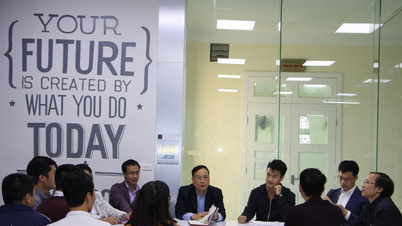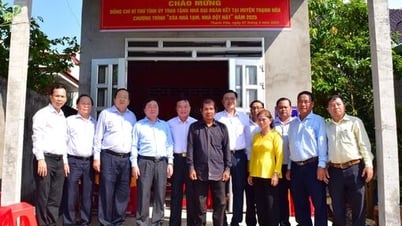Invest in shared labs
One of the challenging targets set in Resolution 57/NQ-TW is that the budget for research and development (R&D) reaches 2% of GDP, of which the majority of the funding for this activity comes from businesses and society, at 60%. In the context of science and technology enterprises, especially small and medium enterprises, facing financial and infrastructure difficulties to carry out innovation, the use of shared laboratories is an important solution. The problem is that it is necessary to promptly invest in key national laboratories for shared use by research institutes, universities, businesses, organizations, and individuals in need.
Previously, Vietnam invested in 15 national key laboratories but they did not operate effectively because they were not opened for public use as originally intended. The reason was that there was no set budget for rental or shared use, and the State did not allocate funds to maintain the laboratories. After a period of operation, the equipment is now outdated and most of these laboratories have closed despite the great demand from society. Recently, a number of universities and research institutes have received State support to build key laboratories, helping to increase the research potential of the invested units, but these are still closed laboratories.
According to Dr. Nguyen Quan, former Minister of Science and Technology, the State needs to invest in new national key laboratories, focusing on serving key projects on semiconductors, nuclear power, the North-South high-speed railway project, or for research on agricultural processing, varieties, genetic modification, medicine... Along with that is a management and usage mechanism so that the laboratories can be exploited effectively...
Many businesses expect that using shared equipment will help businesses reduce investment costs, promote innovation, and enhance cooperation. A typical example is the focus of Hoa Lac Hi-Tech Park, which is to encourage and facilitate the effective exploitation of the park's facilities and technical infrastructure to serve training, research, technology development, and innovation activities. As a bridge for accelerating innovation, the Hoa Lac Hi-Tech Park Management Board is implementing a mechanism to expand access to and use of existing research infrastructure and laboratories for people inside and outside the park. In particular, open laboratories are one of the priority solutions.
In addition to infrastructure, businesses also face major challenges such as difficulty accessing information about technology, not being able to distinguish which technology is good; wanting to innovate technology but not having money; and not having enough highly qualified human resources to receive technology. Therefore, according to Mr. Pham Duc Nghiem, Deputy Director of the Department of Startups and Technology Enterprises (Ministry of Science and Technology), the policy must solve this problem by funding cooperation projects between research institutes and universities instead of just funding each individual party. This way, businesses can take advantage of experts, scientists, and laboratories of research facilities and quickly transform technology into production.
On the business side, the State wants to build data on experts in each field so that businesses can trust them to solve their problems and “pain points”. Scientists need to change their thinking, proactively provide information to the market about the products they are making or how they can support businesses. Research institutes and universities even establish expert groups and working groups to support businesses in innovation. When businesses see that such support is effective, they will certainly move to a stage of cooperation for mutual benefit.
Support the development of high quality human resources
The biggest difficulty facing private enterprises today is the lack of high-quality human resources. In the context of strong market changes, some enterprises realize the need to invest in internal human resources, recruiting young personnel with knowledge of digital technology to meet new requirements. However, for many private enterprises, especially small and micro enterprises, possessing a team of highly qualified personnel to create new technology or master advanced technology is beyond their reach. According to experts, the support of research and training institutions is needed to train and research according to the needs and orders of enterprises.
Another important factor is the need for a Venture Capital Fund to support small and medium-sized enterprises to have the opportunity to receive capital to implement innovation and digital transformation projects. Many enterprises have very potential technology ideas, but lack capital to implement them. Venture Capital Funds will help reduce risks and promote projects, especially incubation projects in the early stages. Many successful models in developed countries such as the United States, Israel, South Korea, etc. have proven that with venture capital support, many small enterprises have created major breakthroughs in technology, contributing to promoting economic development.
At that time, businesses will have enough capacity to face global challenges and contribute to the sustainable development of the national economy. Businesses are looking forward to breakthrough policies being concretized soon to have more resources to support the implementation of strategic projects of businesses.
-----------------
See previous episode:
Source: https://nhandan.vn/doanh-nghiep-tu-nhan-dong-hanh-doi-moi-sang-tao-chia-se-nguon-luc-nang-tam-cong-nghe-post875760.html



![[Photo] Prime Minister Pham Minh Chinh chairs a special Government meeting on the arrangement of administrative units at all levels.](https://vphoto.vietnam.vn/thumb/1200x675/vietnam/resource/IMAGE/2025/5/9/6a22e6a997424870abfb39817bb9bb6c)
![[Photo] Magical moment of double five-colored clouds on Ba Den mountain on the day of the Buddha's relic procession](https://vphoto.vietnam.vn/thumb/1200x675/vietnam/resource/IMAGE/2025/5/9/7a710556965c413397f9e38ac9708d2f)
















![[Photo] Prime Minister Pham Minh Chinh chairs a special Government meeting on the arrangement of administrative units at all levels.](https://vphoto.vietnam.vn/thumb/402x226/vietnam/resource/IMAGE/2025/5/9/6a22e6a997424870abfb39817bb9bb6c)


































































Comment (0)